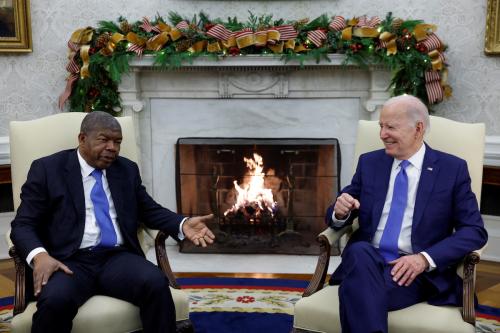The steps announced by the White House yesterday to re-establish diplomatic relations with Cuba and move towards normal travel and trade between the two countries are remarkable. There have been many false starts during the past 50 years of back channel negotiations seeking to improve U.S.-Cuba relations. In recent years, Cuba had already been playing a more positive role in regional and global relations, for example by hosting the Colombian peace negotiations, a process that the United States supports, and by sending medical personnel to combat the spread of Ebola in West Africa. Although pressure in the United States for a change in Cuba policy had been building, the president’s announcement goes beyond what had been discussed in the past and beyond what many thought possible. Easing the restrictions on trade, travel, investment and financial relations between United States and Cuban citizens also builds on the process of economic restructuring that has been underway in Cuba in recent years. This has already produced remarkable transformations in Cuban society, such as an emerging middle class and a growing non-state sector that is offering new opportunities for hundreds of thousands on the island.
It also goes without saying that this is an important story for U.S. domestic politics. U.S. policy towards Cuba has always been controversial, and there is considerable resistance to change even today, particularly in the U.S. Congress. On the other hand, U.S. public opinion towards Cuba has been shifting, particularly across generational and demographic lines. In early 2014, 56 percent of all Americans and 63 percent of Floridians were found to be favorable to improved relations.
President Obama’s use of executive authority to push for restored diplomatic relations with Cuba and liberalization of economic ties creates a historic opportunity to revitalize hemispheric relations, but there are also some potential pitfalls ahead.
New Space for Productive Regional Engagement
Since the 1990s, Latin America’s support for U.S. policy towards Cuba in the hemisphere has dwindled. Even the once-shared consensus on the defense of democracy and human rights, embodied in institutions such as the Inter-American Commission on Human Rights and the Inter-American Democratic Charter, has weakened in recent years. This meant that most Latin American states no longer accepted a lack of democracy as a valid rationale for excluding Cuba from hemispheric institutions, such as the Organization of American States or the Summit of the Americas. Leaders of the region made this clear to President Obama at the Cartagena Summit of the Americas in 2012, and until yesterday, there was a real possibility that U.S.-Cuba relations might be the focus of another acrimonious Summit in Panama in 2015.
As Richard Feinberg argued yesterday, there is a major opportunity to reframe U.S. participation in the upcoming Summit of the Americas. By re-establishing diplomatic relations with Cuba, the United States has removed a contentious issue that has been a thorn in U.S.-Latin America relations and has diverted attention from more productive areas of collaboration in the hemisphere. This policy change creates a space for the U.S. to engage more productively with Latin America on a broad agenda, including on key Summit topics of democracy and human rights, as well as on global competitiveness, energy and environment, and social inclusion. All of this serves to enhance U.S. soft power in the region, which has eroded in the past decade.
Divergent Interests vis-à-vis Venezuela
However some states in the region, particularly Venezuela, are likely to be quietly concerned by the implications of normalized U.S.-Cuba relations. Venezuela has been a major supplier of oil to the United States historically, although this role has declined in recent years. U.S.-Venezuela relations have been quite poor for over a decade, and Venezuela has led a coalition of countries, known as ALBA (Bolivarian Alliance for the Peoples of Our America), that have adopted generally anti-U.S. foreign policies. Starting in the early 2000s, Venezuela has supplied oil to Cuba on very generous terms in return for Cuban technical, medical and political support. So while President Maduro eventually welcomed the historic news on U.S.-Cuban relations, initial reactions in Caracas suggest that Venezuela was never fully informed of the state of negotiations with the United States. If true, this is a telling indicator of the state of Cuba-Venezuela relations.
Venezuela’s economy is rapidly deteriorating, and the Cuba-U.S. policy shift highlights its increasing isolation in the region. Venezuela depends on oil for close to 95 percent of its foreign exchange and it imports over 70 percent of basic consumer goods. The decline of oil from an average of $111 per barrel in 2012 to less than $60 today represents a dramatic decline in the government’s ability to satisfy basic consumer needs, let alone fund Venezuela’s international petrodiplomacy in the region. Even President Maduro has admitted that his regime needs oil at $100 per barrel, and other estimates put Venezuela’s breakeven point even higher. The rapid deterioration of Venezuela’s economy is also a blow for whatever soft power its Bolivarian regime had accumulated internationally.
The United States and Cuba have both invested considerable prestige and diplomatic effort in securing the present agreement, and it opens up a new panorama for inter-American relations. In addition to the themes of democracy and human rights that will be discussed at the Summit of the Americas, there are important areas for cooperation between the two countries on security and energy in the Caribbean. But both the United States and Cuba are part of a triangular relationship with Venezuela, a regime whose economic fortunes are rapidly deteriorating and whose political future looks increasingly troubled. Cuba and the United States will inevitably have differences of opinion over how to handle Venezuela, given their very different historical experiences and government-to-government relations with this country. Managing these tensions will be an important part of successfully completing the agenda that President Obama has set out.



Commentary
New U.S.-Cuba Policy Will Revitalize Hemispheric Relations
December 18, 2014